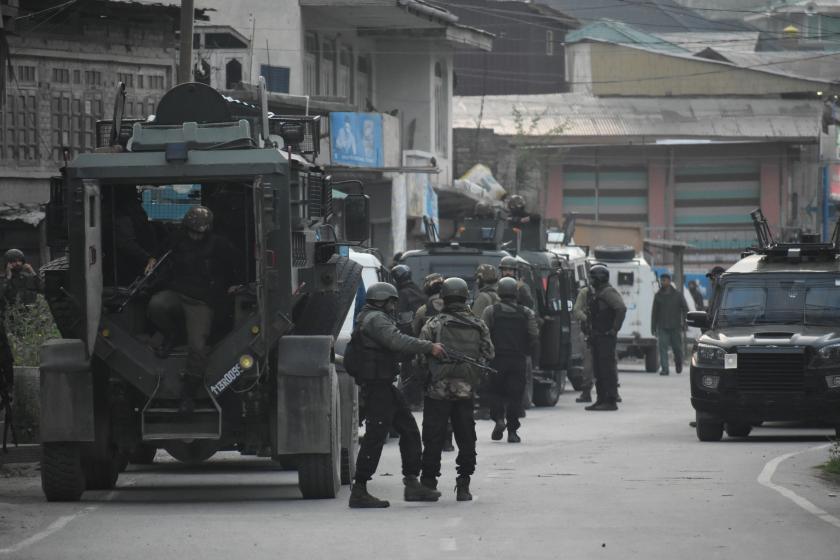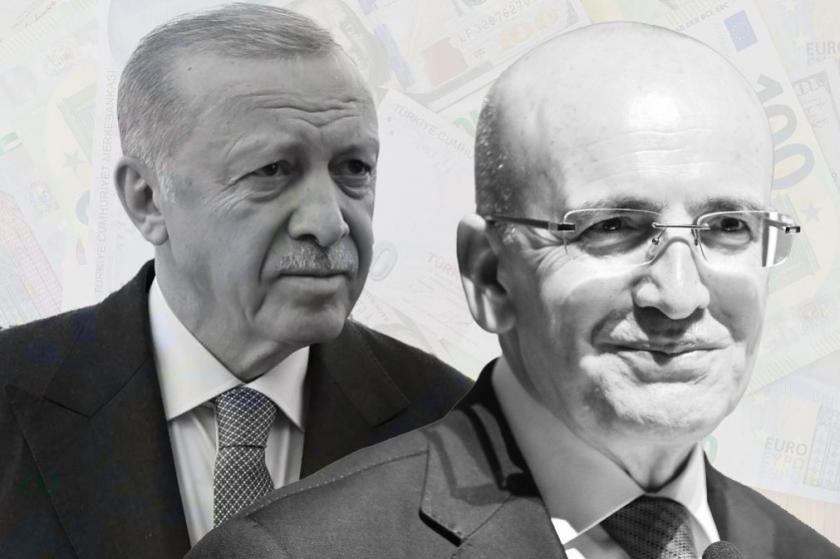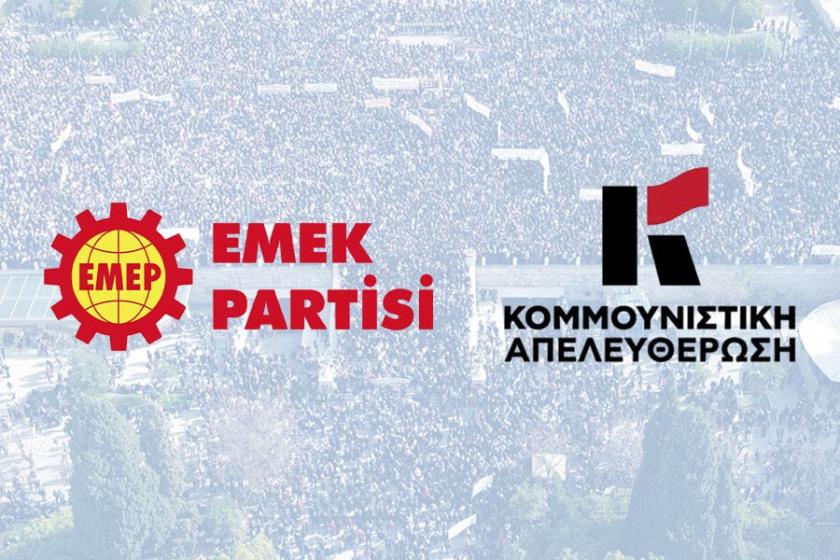Selma Gürkan: Halting the ‘Presidential Alliance’ is the first step towards democracy
'24th June is a critical point in strengthening the one-man regime. It is important that HDP surpasses the electoral threshold to stop this advance.'

Fotoğraf: MA
Serpil İLGÜN
Those that will be running against Erdoğan in the Presidential election and which parties will enter alliances in the parliamentary elections were decided within the last week.
As expected, a ‘People’s Alliance’ on parliamentary elections only has been agreed between Republican People’s Party (CHP), İYİ (Good) Party, Islamist Saadet Party (SP) and Democrat Party (DP); HDP has been left out of this alliance. The presidential candidates will be Selahattin Demirtaş and Muharrem İnce for Peoples’ Democratic Party (HDP) and CHP respectively. The attempts to an alliance between labour and democratic forces outside of the parliament have been unsuccessful.
We spoke to Selma Gürkan, chairwoman of the Labour Party (EMEP), regarding the current situation and their election policies. EMEP had recently called for an electoral alliance and a joint candidate between the forces of labour and democracy.
It has long been claimed that the ruling bloc would go to an early election. EMEP can't take part in the elections to be held on 24 June. Were you unprepared?
An early election in Autumn 2018 was expected. However, faced with the problems brought on by the worsening economic and political conditions, the ruling block called a snap election. Hence, we were politically ready but it is the undemocratic legislation of party and elections laws that left us unable to take part in the elections.
A party must have representation in 41 cities, and two-thirds of the towns within those city limits, within the six months prior to an election. The Supreme Court can make undemocratic demands based on membership by address and each organisation to have held their congress before an election; hence it can make organisations and memberships void. Consequently, we had enough representation but these were reduced in numbers and EMEP was prevented from entering the elections. We continue to work towards overcoming these barriers.
You stated your support for Selahattin Demirtaş and HDP in the presidential and parliamentary elections respectively. How did you arrive at this decision?
We didn’t base our decision on which of the alliances to side with. We looked at the main issues: the crucial political issues in Turkey; the oppressive regime of the ruling block; the new legislation and bans curbing rights and freedoms; the democratic resolution of the Kurdish issue, which is a strong indicator of democratisation in Turkey.
24 June is a change of regime, a critical step in the establishment and strengthening of a ‘one-man, one-party rule’. We believe that HDP surpassing the electoral threshold is very important to halt this advance. Furthermore, oppression and legislation that denies the political will of the Kurdish people, and especially attempts to keep HDP out of the parliament are continued. The need for solidarity between Kurdish and Turkish people and the peaceful-democratic resolution of the Kurdish issue becomes more pressing by the day.
Does your support mean putting forward candidates through the lists of HDP? What was the framework in your discussions?
We believe as a party that forces of labour, democracy and peace should enter the presidential and parliamentary elections as an alliance around their immediate demands. We do not think it is right to put forward a candidate without such an alliance. It is also true that under the current conditions the basis for such an alliance is greatly restricted.
What do you think on HDP’s actions in this process? What are your thoughts on the criticism they receive: on their talking about the necessity for the unity of democratic forces but not attempting to achieve this in practice?
An alliance in these undemocratic election conditions is a crucial need. You would expect the forces of labour, democracy and peace to take a responsible stance in their practice. Furthermore, it is clear that there is such a demand and expectation from the people. We think that the HDP executive did not show determination and courage in organising and taking steps to achieve this; this is what leads to the criticisms. It is important that future discussions are held on a united, joint stand in the struggle for democracy.
You called on democratic forces for an alliance and a joint candidate but this did not receive support. Freedom and Solidarity Party (ÖDP) Executive member Alper Taş said that it was too late for this; stating that EMEP did not engage in their attempts for a joint candidate before the elections were called. Why didn’t you?
Rather than a democratic alliance, ÖDP persisted on a left-socialist alternative that did not involve CHP and HDP. We didn’t think this was the right approach; hence, we an agreement could not be reached in the negotiations.
In terms of being ‘too late’, it is still possible to gather around common democratic demands and mutual interests saying “we, the listed parties, will enter the election as a block within this framework.” There is still time for this; we did not miss the train yet.
On the other hand, it is clear that the election campaign will continue past 24 June as a struggle for democracy. This will not be an election about introducing candidates and asking for votes; we are in an election period of bans and obstructions, more importantly, we are under State of Emergency (OHAL) conditions and are governed through Statutory Decrees of law (KHKs). Thus, the president is exempt from electoral restrictions thanks to the latest KHK. Even that is not enough: partner of the ruling coalition, Devlet Bahçeli, openly threatened people who will support those candidates that need 100 thousand signatures to stand for office. Hence the clear need for democratic unity and alliances both prior to and after 24 June.
What will your election campaign look like?
We will primarily try to expose the political regime this rulership is after; a campaign that aims to show workers from Turkish, Kurdish, Arab and all other backgrounds how a ‘one-man, one-party rule’ is dragging the country towards a catastrophe. We will try to expose the economic policies of Erdoğan and his governments: attacks on freedom of speech and the media, the organisation of the working class, political rights and freedoms. We will expose the policies of the government hostile to the people and the workers; policies that make life unbearable for women, youth and children. This is our main duty anyway and the election campaign will be a vehicle to deliver this. We’ll take this campaign to all factories, workplaces, universities and colleges.
What will your party do if the presidential elections go to a second round?
We need to see if there will be the second ballot; it is possible that there won’t. We have seen this government’s disregard for the will of the people - in previous elections on 7 June and 16 April -when it doesn’t get the desired results form the ballot box; they will try everything they can to hold on to power. Erdoğan’s threat to the people in saying “you attempted to go for a different path and we all witnessed the consequences” points to this. What did we see when Erdoğan and his government were unhappy with the results on 7 June; bombings, massacres, conflict, the devastation of cities and the loss of hundreds of lives… The rulership dragged the country into chaos and conflict and followed policies aimed at polarising the population. Hence, he is giving the message that consequences that are much worse could follow unsatisfactory election results.
It is highly likely that they will try to confiscate ballot boxes and cause chaos and disputes at polling stations. Therefore, while we attempt to strengthen democracy and create an alternative political choice, we should also have a perspective that takes necessary steps to protect ballot boxes, that prevents the fraudulent sacrifice of the will of the people.
Consequently, the focus for us today will be a campaign that ensures the defeat of the ‘Presidential Alliance’ and a second round in the presidential election. We would like to support the same candidate as in the first; if the developments are to the contrary, our executive will review the situation and take necessary decisions.
POLARISATION CAN ONLY BE DEFEATED BY BREATHING LIFE INTO DEMOCRATIC DEMANDS; NOT BY CREATING ANOTHER RIGHTWING BLOCK
‘People’s Alliance’ was formed without the HDP; forming another rightwing, nationalist, conservative alliance against ‘Presidential Alliance’. What are your thoughts on this?
This means doing politics within the boundaries drawn by Erdoğan, especially for CHP. Despite secular and social-democrat elements within it; the real make-up of this alliance is clear. Political activity within boundaries determined by Erdoğan is what makes him so successful. One needs to look at Erdoğan’s election promises to decide on the alternative needed to be put forward against his alliance. What does Erdoğan say?: more democracy; more rule of law; more welfare and income. Against a rulership that admits that the lack of these, one must argue for a political regime that protects freedoms and rights. A second rightwing block will not disperse the polarisation and unite the people; that will be achieved by demanding democratic rights and political freedoms and meeting immediate economic and social demands.
‘ANYONE BUT ERDOĞAN’ IS THE WRONG ATTITUDE
One of the main points the ‘People’s Alliance’ agrees upon is a return to the parliamentarian system; Is this the issue? Will a parliamentarian system solve Turkey’s political crisis?
We are against the presidential system but do not want the old parliamentary system back either. However, it is important to halt the political discourse represented by the values and political reaction of Erdoğan and the ‘Presidential Alliance’. ‘Anyone but Erdoğan’ would be the wrong attitude. The defeat of his alliance and the election of a new president will not mean that Turkey is over its problems; it would mean the defeat of a government that wants to establish a reactionary and fascist political regime. Of course, this would not be insignificant but will not mean a democratic triumph either.
Our struggle will continue for a political system where: the judiciary is free and democratic; the press is free; the governance of the country is determined by the will of the people; the election and political party legislations are democratic; a constitution that secures all of these is established. We continue to struggle for a system based on the rule of the working class.
{{352071}}
REGARDLESS OF ITS POWER, NO RULERSHIP CAN DEFEAT THE ORGANISED ACTION OF THE PEOPLES
Another major point of discussion is the safeguarding of the elections. The recent changes to election legislation and the anti-democratic conditions of OHAL and KHKs paint a picture that is worse than 16 April. How will these ‘problems’ of the elections be overcome?
It won't be easy. The legalisation allowing unstamped voting cards to be valid and the ability to call security forces to polling stations seem to have made corrupt election practices legal. It is still not impossible to defend the ballot boxes; if we work together and unite our resources, we can reverse the situation in terms of safeguarding the ballot boxes. No matter how powerful, no rulership can defeat the organised action of the peoples. Hence we should not resign to the fact that there will be corruption, that they will steal votes anyway; we can prevent this happening.
IF YOU ACCEPT THAT THE KURDISH ISSUE IS A DEMOCRATIC ISSUE, YOU WILL TAKE AWAY THE GOVERNMENT’S AMMUNITION
Despite some statements of Kılıçdaroğlu being seen as an attempt to include HDP in the alliance, it is clear that CHP ‘did not insist’ on the inclusion of HDP. Do you think Akşener (nationalist leader of the İyi party) was the determining factor in this or reservations of ‘attacks’ from the ruling block or the fact that CHP leadership are on the same page as Akşener on the resolution of the Kurdish issue?
All those factors play a role. Kılıçdaroğlu and his group were already saying that it would be better if HDP entered the elections alone and surpassed the threshold. This is a reflection of the parties system distancing themselves from a democratic solution to the Kurdish problem. Their stance fed chauvinism and racism over the Kurdish issue. And because they built their politics on these, the government can pressure the opposition, even on insignificant points. Today, even when you defend peace in the face of war, the political rulership labels you as a sympathiser, propagandist or a member of the PKK. The way to combat this to accept the Kurdish issue as a fundamental democratic problem, defend a democratic and popular solution based on rights. When you do that, you will take away the government’s ammunition. This can easily be explained to the masses; remember how the mood of the public had changed when the peace process was discussed during 2013. What we need is politics that prohibits chauvinism and racism that will disperse the polarisation within society; demonstration of the will to resolve the Kurdish issue in a peaceful and democratic way. This will get a response from the people; we should not refrain from this. Aside from a few weak voices within it, the central policy of CHP on this issue has always been distanced and hesitant, following the traditional state lines.
IT IS CLEAR THAT THE VISIT TO GÜL WAS NOT A COURTESY CALL
A meeting between the Chief of Defence Staff, the Presidential spokesperson, İbrahim Kalın, and the former President, Abdullah Gül, was confirmed by Gül himself. He said that it was “a visit not to pressurise or preach but just a courtesy call”. What is your take on this visit?
The political history of Turkey is littered with military coups and military warnings. Hence, it is clear that such a visit to the house of Gül- seen by some as the strongest possible candidate against Erdoğan - arriving in a government helicopter cannot be seen as a courtesy call; the claims that it is are not convincing. What needs to be done is to share the contents of the discussion with the public in their entirety. But this is something that is not in the political tradition of the old or new bourgeois politicians in Turkey. This visit alone is a striking demonstration of the position of the ‘one-man, one-party regime’.
DON’T BE FOOLED BY THE ELECTION MANOEUVRES AND BRIBES OF THE GOVERNMENT
A legislative package revealed last week offered 1000TL to the retired on religious days, as well as tax and planning amnesties. AKP had refused demands for these measures previously, citing ‘lack of funding, and the strain they would put on the economy’. Will meeting these demands during an election period give AKP the result it wants?
‘Lack of funding’ is a classic excuse used by governments over the years to avoid meeting the demands of the workers. There are funds of 130 million dollars offered as incentives to the capitalists but no funds for the workers.
On the other hand, the retired - living in hardship and poverty - will, of course, be pleased by the offer of 1000TL; so will the self-employed small businesses that will get a tax break. But it is clear that a government that responded to the demands - prior to the elections- of a 2-3% increase with refusal, warning people “not be ungrateful” cannot be expected to have the will to solve the economic and political problems of the population. This is an election bribe and is seen as such in the public eye.
The bribes offered are just a redistribution of peoples’ savings back to them or a reduction in the taxes or interest they are charged. Of course, it has the potential to turn into votes for the government. We call on workers to not be fooled by these bribes, the classic games of bourgeois governments; a call to give Erdoğan - a determined and skilled servant of the capitalists - and the ‘Presidential Alliance’ the lesson they deserve.
WE MUST WORK FOR 24 JUNE WITH THE STRENGTH DRAWN FROM MAYDAY
What message did the recent Mayday celebrations, with a very high rate of participation compared to previous years, give in relation to what we have been discussing?
Despite all bans and prohibitions: women were out on the streets on 8 March; Kurdish people were out on the streets demanding peace and democracy on 21 March; and on Mayday, despite the permissions, accompanied by government attempts to terrorise people, hundreds of thousands of workers and other people demanding peace and democracy filled the streets and the squares. This showed the deepening problems peoples face and their determination to struggle against those.
Hence we carried the strength from 8 March to the jubilation of 21 March; and the jubilation from 21 March to the solidarity, unity and struggle of Mayday. Now we can say stop to the march of the ‘one-man, one-party’ regime with the strength we gained from Mayday. As always, women and youth - targeted by the political leadership - will be the main force in establishing democracy. Our work will also give impetus to our continued democratic struggle on 25 June and beyond. With belief in our strength, our heads held high, with hope and determination we should prepare to win democracy. (EVRENSEL DAILY)
{{351452}}
{{351106}}
{{350359}}






Follow Evrensel